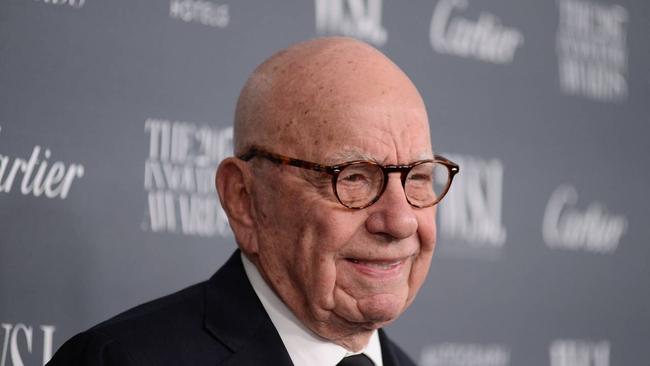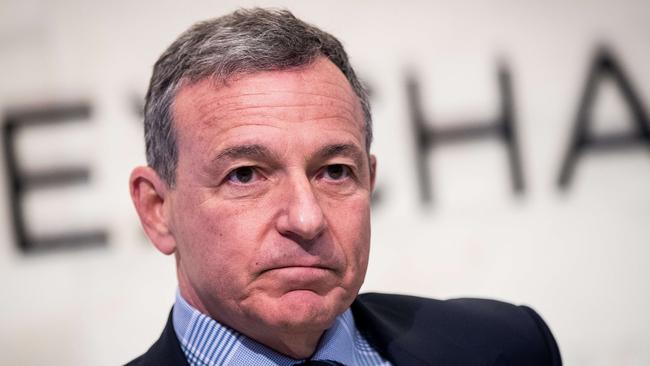Murdoch and Disney in $68.3b 21st Century Fox mega-deal
Rupert Murdoch has struck the biggest deal of his career in a $68.3bn agreement to sell 21st Century Fox assets to Disney.

News Corp executive chairman Rupert Murdoch has struck the biggest deal of his career in a $68.3 billion agreement to sell film and television assets from his 21st Century Fox company to Disney.
Walt Disney said it would buy select assets from 21st Century Fox for $US52.4bn in stock, as Disney moves to increase its footprint in video streaming and television amid a changing media landscape.
Disney’s acquisition includes the company’s Twentieth Century Fox film and television studio and its international cable TV businesses. In the deal, Disney will also assume about $US13.7bn of 21st Century Fox’s debt.
Fox Broadcasting Network and its stations, Fox News Channel, Fox Business Network, Fox Sports 1 and 2 and the Big Ten Network will be listed in a separate company for shareholders, Disney said.
The new company will also include Fox’s Roku investment and a Los Angeles studio lot, while Disney will get Fox’s Hulu interests and Fox Sports Regional Networks.
Fox shareholders will receive 0.2745 shares in Disney for each Fox share owned in the deal. Both companies’ boards have approved the deal.
News Corp, The Australian’s parent company, and 21st Century Fox share common ownership.
Shares in Disney rose 0.8 per cent in premarket trading, while 21st Century Fox shares rose 2.6 per cent.
Disney Chairman and Chief Executive Bob Iger, previously scheduled to retire in July of 2019, has agreed to continue in both posts through the end of 2021, the company said.
Most of the assets Disney is buying would be put to use in Mr Iger’s quest to transform his company into a streaming-video giant that can go head-to-head with rivals such as Netflix Inc. He wants Disney to have its own relationships with consumers and a broad array of content to offer them online.
Mr Iger also wants to strengthen Disney’s largest business, television, which has taken a hit as consumers cut back on traditional cable packages and spend more time with digital providers.
The deal would mark a significant turn for Rupert Murdoch’s media empire after decades of expansion that created a titan in the entertainment industry.
21st Century Fox had other suitors for its assets, including cable giant Comcast Corp. One reason it leaned toward Disney was the perception that the deal wouldn’t face as much antitrust scrutiny, a person familiar with the matter said.
The Justice Department has sued to block AT & T Inc’s attempt to purchase Time Warner Inc., signalling that a deal in which a major content distributor, such as Comcast, is buying a big content company could be heavily scrutinised.
Mr Iger, after the deal was announced, said he recognised it would face antitrust scrutiny.
“We know that a deal of this nature and of this size is obviously going to receive a significant amount of regulatory scrutiny both in United States and internationally,” he said.
He added he believes regulators and politicians will “look at this from a consumer point of view and if they look at it from a consumer point of view they should quickly conclude that the aim of this combination is to create more high quality product for consumers around the world and to deliver it in far more innovative and compelling ways.”

White House spokeswoman Sarah Huckabee Sanders said President Donald Trump congratulated Rupert Murdoch on the deal. She said Mr Trump “thinks that, to use one of the president’s favourite words, that this could be a great thing for jobs.”
The Disney-Fox deal raises the prospect of a future in which media is dominated by a few giants: Comcast-owned NBCUniversal, a combined Disney-Fox, and — if it survives the legal battle with the government — AT & T. A group of smaller companies, including CBS, Viacom, Sony Pictures Entertainment and Lions Gate Entertainment Corp., could look to do their own deals to gain more scale and leverage in the industry.
Media companies like Disney and Fox are increasingly concerned that the biggest competitive threats in the future won’t come from rival media conglomerates, but rather from technology companies. Netflix and Amazon.com Inc. are building substantial subscription businesses by reaching consumers directly and are investing huge sums in original programming. Meanwhile, Facebook and Google are winning an overwhelming share of digital advertising dollars.
The growth of Netflix and Amazon, in particular, has changed the equation for Mr Iger. Since becoming CEO in 2005, he has made Disney the most successful collection of brands in Hollywood due in large part to the $US7.4 billion purchase of Pixar Animation Studios and subsequent deals for Marvel Entertainment and Lucasfilm Ltd., the maker of Star Wars.
The popular franchises Disney gained in those deals have made it the envy of other entertainment companies and have driven substantial growth in its theme parks and consumer-products divisions.
Buying Fox also would further augment Disney’s collection of franchises. It would gain Avatar, which is already represented in the Walt Disney World theme park in Florida under a licensing deal, and Marvel’s X-Men superheroes, to which Fox has had big-screen rights since the 1990s.
Disney’s television business has faced struggles. It generated two-thirds of the company’s operating income in fiscal 2012 but has fallen rapidly to less than 47 per cent. Cord-cutting and falling ratings for traditional TV networks have battered that business, pressuring Disney’s stock price.
To address that challenge, Mr Iger in August announced Disney is making direct-to-consumer streaming services its top priority. The company is launching one called ESPN Plus, meant to supplement its cable sports giant’s TV offerings, in 2018. The following year, Disney plans to launch a family entertainment service that will include most of its movies and television shows, many of which it currently sells to Netflix in a deal that will expire next year.
Disney also spent nearly $US2.6 billion for majority control of streaming technology BamTech, which is powering its new digital services.
The Fox acquisition is an acknowledgment by Mr Iger that Disney will need more help to seize control of the digital moment. With Fox, his company will gain more power to compete against Netflix and other digital giants and a larger, more-diverse collection of content to offer on streaming platforms.
Disney would get majority control of Hulu as well, giving it another streaming service to complement the one it is launching in 2019.
A purchase of Fox also would help Disney strengthen its existing television business. Fox’s Twentieth Century Fox Television is one of the industry’s most prolific producers with successful shows on every major broadcast network. Its hits include NBC’s This Is Us and ABC’s Modern Family.
Disney also will get Fox’s biggest television asset — the animated hit “The Simpsons,” which has generated billions in revenue for the company
Wall Street Journal




To join the conversation, please log in. Don't have an account? Register
Join the conversation, you are commenting as Logout